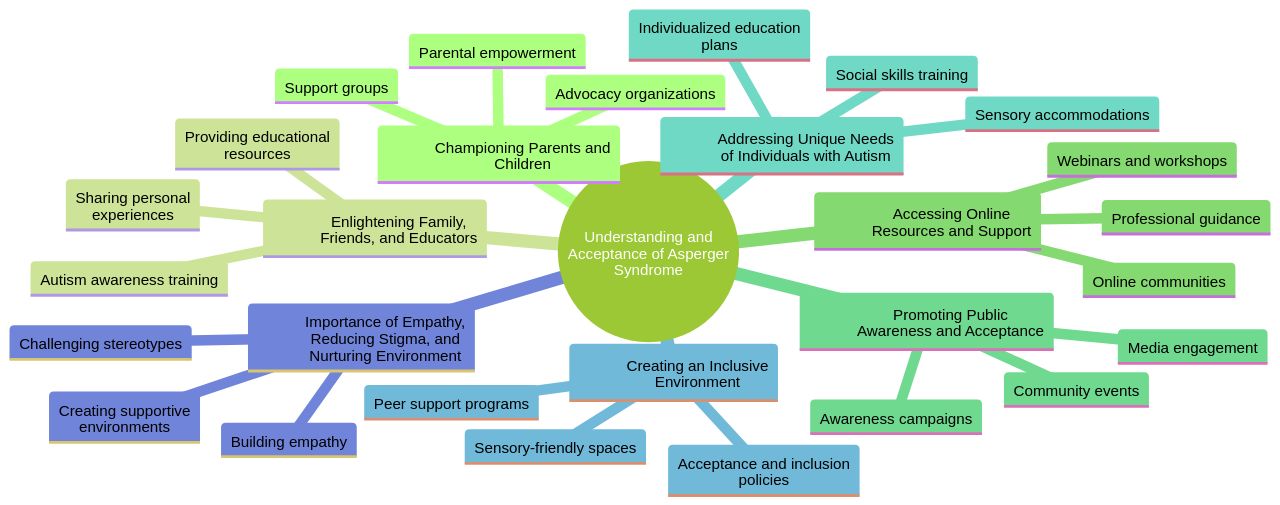Introduction
The journey of parenthood can be uniquely challenging when raising a child with Asperger Syndrome. It requires a comprehensive understanding of the child's specific needs and the ability to secure the necessary support. In this article, we will explore strategies for parent advocates of children with Asperger Syndrome, including building a support network, developing individualized strategies, promoting understanding and acceptance, and understanding the impact of Asperger Syndrome on family dynamics. We will also discuss the importance of establishing a balance between over-parenting and fostering independence, as well as the role of parent advocates in creating a nurturing environment for their children. By providing guidance and resources, we aim to empower parent advocates in their journey of supporting their children with Asperger Syndrome and ensuring their well-being.
Understanding Asperger Syndrome: Strategies for Parent Advocates
The journey of parenthood is uniquely challenging when raising a child with autism. It requires a comprehensive understanding of the child's specific needs and the ability to secure the necessary support. Autism affects approximately 1 in 36 children and 2.2% of adults nationwide, reflecting the shared struggles of many parents. These struggles are systemic, not personal, as evidenced by ten autistic mothers who detailed their difficulties in obtaining support for their children. For parents who are also autistic, the journey can be even more intricate. However, their unique perspectives often empower them to craft effective solutions that meet their complex needs. This is a point highlighted by psychologist and researcher Dr. Marjorie Aunos, an expert in parenting with disabilities.
It's not uncommon for parents to feel isolated due to their child's behavior, leading to increased stress. Initiatives such as the Autism Welcoming Initiative, which strives to create more accessible public spaces for autistic individuals, can alleviate this isolation. Establishing a supportive network, maintaining open communication with their child, and regularly monitoring their child's progress are all critical steps for parents. The journey of each parent is deeply personal, shaped by their beliefs, cultural factors, and individual circumstances. While parents naturally want the best for their children, over-parenting can hinder their child's growth of confidence and independence. A balance must be struck, as suggested by Cathy Guttentag, Ph.D., an associate professor at the Children's Learning Institute at UTHealth Houston. Parenting a child with autism presents immense challenges, but it also brings joy and hope with each new day and each step forward. A subscription to asd.media can provide parents with unlimited digital access to a wealth of resources and support, for either a yearly fee of $130 or a monthly fee of $5-7.

The Impact of Asperger Syndrome on Family Dynamics
Asperger Syndrome, a neurodevelopmental disorder, can significantly alter a family's dynamics. It alters social interaction, communication, and behavior, requiring the family to adapt to the unique needs of the child with the condition. Research indicates that neurotypical siblings often experience feelings of loneliness and depression, stemming from a lack of reciprocity in their sibling relationships. Family life often revolves around the person with Asperger Syndrome, even in mild cases, which can lead to resentment among neurotypical siblings who feel they receive less parental time and attention. This situation can become particularly acute in adulthood, when maintaining a meaningful relationship with a sibling with Asperger Syndrome may become increasingly challenging.
Understanding these dynamics is crucial for those supporting families impacted by Asperger Syndrome. It is also worth noting that parents sometimes discover that they are 'on the spectrum' after their child is diagnosed. This revelation can bring additional complexities into family relationships, as they navigate the implications of this newfound understanding. The U.S. Centers for Disease Control and Prevention estimates that about one in 45 people, or 5.4 million people aged 18 and older, have Asperger Syndrome. Therefore, understanding the impact of Asperger Syndrome on family dynamics is not just crucial for families directly affected, but also for society at large.
Promoting Understanding and Acceptance
A critical role for those championing parents and children with Asperger Syndrome is fostering understanding and acceptance within the family unit and the larger community. This involves enlightening family members, friends, and educators about the unique traits and hurdles associated with Asperger Syndrome, thereby cultivating empathy, reducing stigma, and establishing a nurturing environment for the child. By connecting with organizations and services that cater to the neurodiverse community, parents and carers can access a wealth of online resources, practical advice, and support from other families, which can be instrumental in their journey. Moreover, the importance of public awareness and acceptance is underscored by the Autism Welcoming Initiative, which aims to create community spaces where individuals with autism feel comfortable and accepted.
This initiative not only trains businesses to accommodate the needs of autistic individuals but also helps alleviate the anxiety parents often feel about their child's behavior being misunderstood or judged. As the prevalence of autism continues to rise, with males being four times more likely to be diagnosed than females, it is crucial to ensure that the unique needs of these individuals are addressed. This includes promoting understanding and acceptance of autism, providing training and support for professionals working with individuals on the spectrum, and ensuring that policies and programs are inclusive and focused on the individual. Through diligent monitoring of progress and strategic adjustments, along with comprehensive assessments and personalized plans, we can create an environment where every child is valued, understood, and supported.

Building a Support Network
The role of a parent advocate is pivotal in establishing a robust support network for their child diagnosed with Asperger Syndrome. This network is composed of professionals like therapists, counselors, and special educators, along with other parents who have children with Asperger Syndrome. By forming such connections, parents can share resources, exchange advice, and provide emotional support. The rise in autism diagnoses has led to an increase in such communities. This growth, coupled with the fact that most children with Autism Spectrum Disorders have at least one mental health condition, underscores the need for strong support networks. Parent advocates often face the challenge of balancing their responsibilities while managing their time effectively. The high stress levels can lead to exhaustion, as observed in parents of special needs kids who have an extremely high divorce rate (around 80%). However, the support of fellow parent advocates can be a source of solace.
For instance, when a child named Clare was diagnosed with a rare form of epilepsy, her grandparents provided immense support to her parents, giving them much-needed comfort. Building a network is not just about shared experiences, but also about shared resources. Groups like Neurodiverseomattic and small charities provide support and resources for neurodivergent individuals and their allies. They connect a Neurodiverse community of parents, caregivers, and autistic individuals with organizations and services. The immediate feeling of support experienced by parents who shared similar experiences is an essential aspect of these programs. Parent advocates, through their perseverance and dedication, bring about positive outcomes, including increased parent engagement with services, a decrease in out-of-home care placements, and improved rates of reunification. While these findings are significant, further research is needed to continue examining the various models and their effectiveness in different settings. In conclusion, parent advocates play a crucial role in supporting their children with Asperger Syndrome, creating a supportive environment that fosters growth and resilience. By connecting with others in similar situations, they are able to share resources, advice, and emotional support, contributing to a better quality of life for their children.
Developing Individualized Strategies
Every child diagnosed with Asperger Syndrome is distinctive, requiring an individualized support plan. The process is initiated through a comprehensive evaluation by a Board Certified Behavior Analyst (BCBA), followed by setting specific, measurable goals for the child. This process is often accompanied by the creation of an individualized education plan (IEP) or behavior intervention plan (BIP), focusing on the child's strengths and addressing their challenges. Regular monitoring of the child's progress ensures the effectiveness of the strategies, leading to adjustments as required. To support children effectively, parents and professionals need to work in harmony, ensuring open communication to align their goals. This partnership is crucial in implementing a range of services tailored to the child and family's needs. The strategies at home, such as establishing routines, providing explicit instructions, and using visual aids, can enhance the child's communication and organizational skills.
As suggested by the National Institute of Mental Health (NIMH), early autism screening as part of routine health care can significantly impact children and families, providing timely support and services. This approach emphasizes the importance of regular health visits and developmental screenings focused on Autism at ages 18 and 24 months. It is also essential to understand that Autism is a 'spectrum' disorder, implying a wide variation in the type and severity of symptoms. Moreover, recognizing the strengths and skills that come with this disorder, such as excellent memory, attention to detail, and honesty, can maximize the child's potential. The strength-based approach, first theorized by social worker Bertha Reynolds, can serve as an effective solution in supporting these children. Lastly, hearing from families who have experienced positive changes firsthand can be incredibly encouraging. These stories not only highlight the challenges overcome but also the joy and hope that comes with progress. It serves as a testament to the effectiveness of these strategies and the potential for change.

Conclusion
The main points discussed in this article include the challenges faced by parents raising a child with Asperger Syndrome, the impact of Asperger Syndrome on family dynamics, strategies for promoting understanding and acceptance, building a support network, and developing individualized strategies. It is crucial for parent advocates to have a comprehensive understanding of their child's specific needs and secure the necessary support. Initiatives such as the Autism Welcoming Initiative can help alleviate isolation and create more accessible public spaces for autistic individuals.
Understanding the impact of Asperger Syndrome on family dynamics is essential, as it can significantly alter the dynamics within a family. Neurotypical siblings may experience feelings of loneliness and depression due to a lack of reciprocity in their relationships with their sibling with Asperger Syndrome. It is important for society at large to understand and accept individuals with Asperger Syndrome, fostering empathy and reducing stigma. Building a strong support network is crucial for parent advocates, as it provides resources, advice, and emotional support. Developing individualized strategies tailored to each child's unique needs is also vital for their growth and resilience.
In conclusion, parent advocates play a pivotal role in supporting children with Asperger Syndrome by creating a nurturing environment that fosters growth and resilience. By building supportive networks, developing individualized strategies, and promoting understanding and acceptance, parent advocates can empower themselves to provide the best possible support for their children. It is important to continue advocating for resources and services that cater to the specific needs of individuals with Asperger Syndrome. By working together as a community, we can ensure that every child is valued, understood, and supported.




